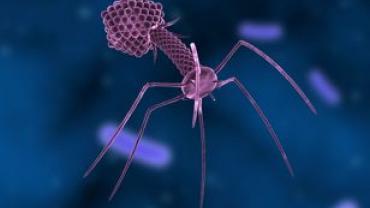
Bacterial resistance to antibiotics has developed faster than the production of new antibiotics. As a result bacterial infections have become increasingly difficult to treat. Recent research has discovered a protein that can kill bacteria. This protein is produced by a virus that attacks bacteria and is a considerable step toward an alternative for conventional antibiotics.
Within this past year researchers at Tel Aviv University's Department of Clinical Microbiology and Immunology at the Sackler Faculty of Medicine have made the discovery of this such protein. "Ever since the discovery of bacteriophages in the early 20th century scientists have understood that on the principle of the 'enemy of my enemy is my friend' medical use could be made of phages to fight viruses" said lead researcher Dr. Udi Qimron.
Bacterial resistance is a natural process; however the misuse and overuse of antibiotics has pushed more bacteria to become more resistant. This problem of this increase in antibiotic resistance has grown so much that the World Health Organization has names it one of the three greatest threats to public health.
Bacteriophages commonly referred to as "phages" are natural viruses that infect and replicate in bacteria. Since they evolved with bacteria they are optimized to kill them. Bacteria evolve to resist phages but phages evolve too and at an exponential rate that chemists dabbling with new generations of antibiotics can never hope to replicate. That makes phages the ultimate antibacterial therapy (lethal adaptive safe and efficient) with billions of years of experience. Bacteriophages are the most common life form on earth and outnumber bacteria ten to one. They have been referred to as Mother Natures little helper and had become a forgotten therapy for quite some time. Russia has been using phages to treat bacterial infections for the past hundred years as they inject their DNA into bacteria rapidly replicate and kill their host. The beauty of this is that phages ignore every cell but the strain of bacteria they have evolved to inhabit. This makes them harmless to human cells and to non-targeted bacteria which distinguishes them from broad-spectrum antibiotics that wipe out the beneficial flora in the intestinal tract along with the bacteria.
The growing levels of antibiotic resistance and the exit of major pharmaceutical companies from antibiotic development really makes phage therapy a great choice for the rising number of untreatable infections.
With multiple antibiotics you have the drugs working with completely different mechanisms of actions whereas with phages they are work the same way. Phage therapy has an 80 to 90 percent success rate against bacteria likely to show antibiotic resistance such as Escherichia coli. In contrast many antibiotics fail outright against the evolved forms of these pathogens.